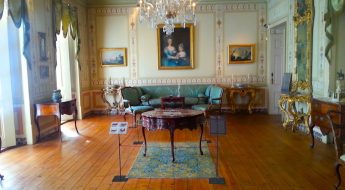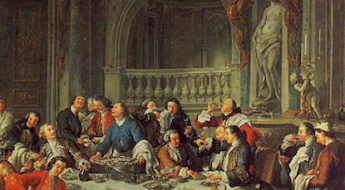Part 4.4 is the fourth part of Chapter 4, and the first of two parts about the royal family’s disastrous, failed flight to Varennes in the summer of 1791.
A Childhood at Versailles consists of the first 5 chapters of the memoirs of Mme de Boigne (1781-1866), née Adèle d’Osmond, who was a French salon hostess and writer. She was born in the Château de Versailles and lived at the court of Louis XVI and Marie-Antoinette until her family fled to England during the Revolution. Later in her long life, she married a rich soldier of fortune 30 years her senior, hosted a brilliant salon in Paris, and became an intimate of the last French queen, Marie-Amélie, consort of King Louis Philippe (r. 1830-1848). Childless herself, Mme de Boigne addressed her memoirs to her grandnephew. The memoirs were not published until 1907, under the title Récits d’une tante, or An Aunt’s Tales. They’ve never been published in English, as far as I know, so I’ve decided to translate the first 5 chapters, the ones that take place mainly at Versailles, and post them here on this blog for interested readers to enjoy for free.
The chapters are quite lengthy, so I’ve broken each one into several parts. In Part 4.4, the author records her father’s projected part in the royal family’s attempted flight from Paris and its aftermath.
A Childhood at Versailles, Chapter 4, Part 4 (4.4)
Once established in Rome, my mother spent several months there in a state of keen anxiety over the dangers to which my father was exposed. He came to join us in the spring of the year 1792,* a few months after the flight to Varennes. Here is what I have heard him tell about it since.
The King had formed the project of leaving Paris in order to go to some army town where the garrison was loyal. M de Bouillé, the commander in the east, was charged with preparing a place to receive the King, along with making the dispositions for the journey. My father was in on the secret. Under the pretext of taking up his post in Russia, he was to leave Paris, stop at the frontier, and join the King wherever he was. He would take down the King’s latest orders for the composition of a letter or manifesto that he was to take to the northern courts, explaining to them the situation of the King, who, having escaped from the clutches of the rebels, was in a position to appeal to all loyal Frenchmen.
The King asked above all of foreign courts that they recognize no authority other than his, and not to treat with the emigrant princes. There was already the keenest animadversion between the Tuileries and the council of the Comte d’Artois.
My father pressed M de Montmorin to send him forth, but the laziness and slowness of this minister, who was not in on the secret, delayed his departure. He did not dare to leave without his instructions for fear of raising suspicion. As the day fixed for the King’s flight approached, he was finally promised that his letters of credence would be ready the next day.
Walking in the Champs-Élysées, he saw the King’s carriage pass by, returning from St. Cloud. The Queen leaned out of the window and made some signals with her hand. He did not understand them then, but they were explained to him the next morning when his valet, entering his room, informed him of the royal family’s departure. It had been advanced by forty-eight hours because a change in personnel among the women of the Dauphin’s household would have brought into it a person who was not trusted.
My father had not seen the Queen since this decision was made and could not have been warned; in any case, he would not have been able to leave without the minister’s instructions. He thus saw that his mission had failed and thought only of how to go join the King at Montmédy. This preoccupation did not prevent him from making his rounds in the morning. He found the city in a stupor. The demagogues were in an uproar, and the royalists did not yet dare to show their joy. Everyone kept silent and no one acted. Soon a courier arrived to announce the arrest; then the city was deafened by the cries and vociferations of all the rabble that could be recruited. The Jacobins redoubled their audacity and the honest folk went into hiding.
It was from his window in the Pavillon de Marsan that my father saw the arrival of the horrible escort that was bringing the illustrious prisoners back to the chateau through the gardens. They were an hour and a half on the way from the drawbridge to the palace. At every step the people stopped the carriage to shower insults on the occupants and with the intention of hauling down the bodyguards who had been tied to the seat. Nonetheless this awful cortege arrived without any blood having been shed; if a drop had been spilled, everyone in that fatal coach would probably have been massacred. They all expected it and were resigned to it.
As soon as it was possible to get in to see the sovereigns, my father arrived. The Queen recounted the events with as much gentleness as magnanimity, losing her composure only at the fatality of the failure of the enterprise, which could change their fate.
*Mme de Boigne is mistaken in her dates, it seems. The flight to Varennes took place in late June, 1791. M d’Osmond’s arrival in Rome in the spring of 1792 was nearly a year afterwards, rather than a few months.
Part 4.5 will give a more detailed account of the flight to Varennes, as told to Mme de Boigne’s father by Marie-Antoinette. It should appear sometime in the second week of June, 2018.


















Leave a Comment